There are freelance creatives who will take every job that comes their way, enjoying the challenge of turning their hand to an infinite range of projects. Then there are those who carve out a niche to suit themselves – an ideal client, a field, a genre that lights them up, and in which they have something really special to contribute.
Soof Andry is the second kind. As a graphic designer and illustrator, they didn’t spend long working in a corporate environment before deciding to break free and follow their own path. Now an established freelance designer, Soof specialises in social justice projects, often with a queer, feminist and/or radical focus. Their bold yet tender and accessible illustrations have given depth and life to diverse projects from radical community initiatives to magazines. A punk at heart, Soof also publishes zines and poetry (check out the brilliant ‘Bloody Hell‘, a forthright zine on experiences of menstruation) and – most excitingly for me – a tarot deck!
In this interview for Follow Your Arrow, Soof shares their journey from newly-qualified graphic designer to anarcho-punk freelance creative, exploring the paradox that is ‘niching without borders’: focusing the kind of work you most love to do without getting boxed in or typecast. We also discuss productive mornings, the inevitability of burnout when you’re finding your groove, and the creative freedom a second income can provide.
Soof Andry, graphic designer and illustrator
Age 25, London
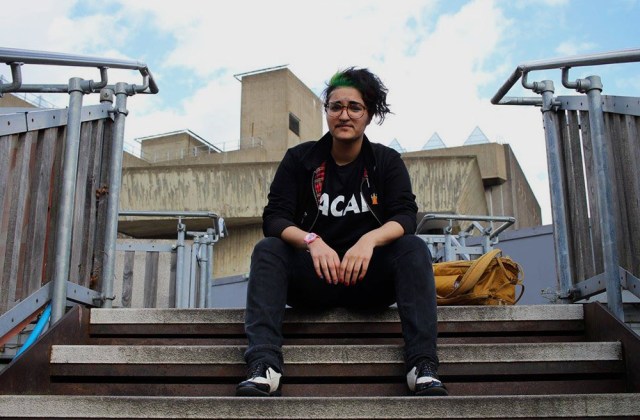
Hi Soof! Can you introduce your work? What’s your mission? Who do you serve?
I do a handful of things, its really hard to sum up in an umbrella terms sometimes. I design, I teach, I lecture, run workshops, do writing, I organise events, I’m into radical self-publishing, activism and so much more. First and foremost, though, I’m a graphic designer by trade.
I’ve been freelancing since I left uni years ago. I generally work with clients from the cultural, arts and activist sector. That could be anything from branding and visual identity work, or book and editorial design to illustrations and consultation stuff. I like to mix up things with writing, activism, and teaching too, I’ve been teaching at a university in London for about three years now, I find that feeds into practice really well and visa versa.
Generally in life all I want to do is: good work for good causes with good people. I want to be a good designer, I mean truly, deeply good at my craft; everything else is semantics, I guess?
How would you describe your approach to self-employment or business? What personal qualities inform your approach?
Professional Anarchist? Executive Anarchist? Something along those lines.
I’m winging it on the whole and that approach has worked out well for me. Although to wing it, and wing it well there’s a lot of hard work, commitment, perseverance, resistance and enthusiasm needed. I always tended to do my own thing and crave my own path both personally and professionally, so this has really set up me up for being freelancer, designer and creative of all sorts. It worked out to my favour.
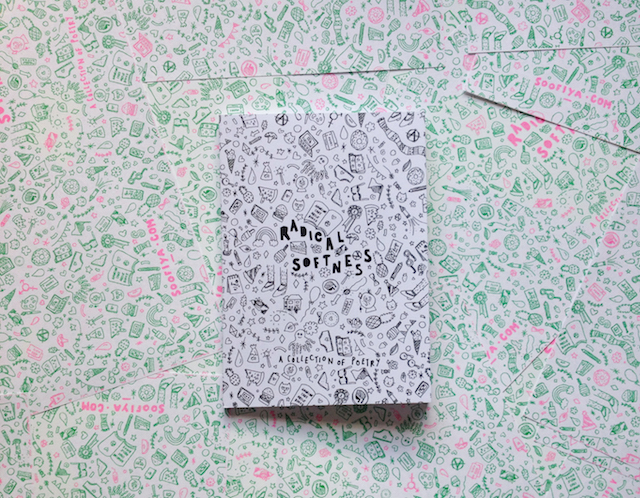
What does a typical day look like for you? Do you have a routine? What is your workspace like?
Typical workday varies depending on what I’m doing. If I’m lecturing, its an early start and a commute into London. I teach at a design school in North Greenwich; I specialise in graphic design there. It’s interesting, fast-paced, keeps me on my toes. You really have to be able to think on your feet, connect dots quickly and genuinely know what you’re talking about and your industry to do that well.
If I’m working on client work or working on my own stuff, I work from home. It took me a while to get the set-up just right – it slowly fell into place and now I can be pretty productive and really work to my flow. My usual day kicks off around 8.30. I’m an early morning person and get a lot more done early on in the day than I do later on, so try to set up days up to work with this. I go through my emails, answer or avoiding answering stuff. Have breakfast and browse Twitter and Instagram. These have proven to be invaluable tools for my work, both in terms on input and output, and makes the lonely freelancer life much softer.
I normally plan a week ahead with work, so I’ll crack on with whatever I’ve got booked in. During the morning I’ll have a podcast on the background, this really helps me focus. I tend to jump between my room, and living room in terms of spaces to work. The living room has lots of natural light in the morning and its normally quiet and cleaner than my desk. I rarely work at desk.
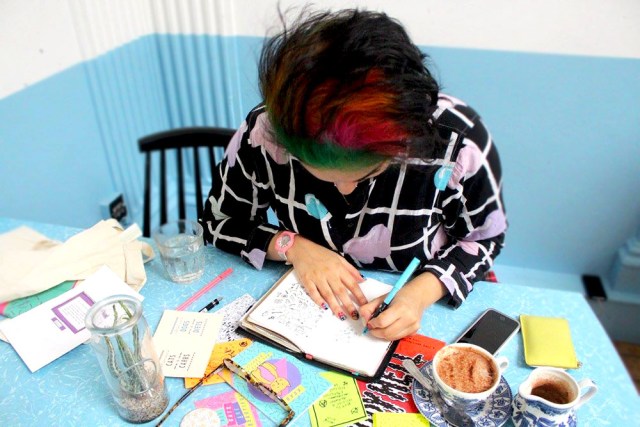
When did you know that this was what you wanted to do?
For ever and ever! I’ve always been a ‘maker’ and constantly producing content. As a kid I was the most content sat on sofa with an entire 500-sheet ream of print paper drawing and sketching cartoons from the TV. When I wasn’t drawing I’d be rallying my siblings and organising ‘protests’ and ‘petitions’ for pizza for dinner. 20-odd years later it feels like mirror of the things I’m doing now.
What were your early goals, your first steps?
When I first started out I wanted to work for the ‘biggest and best’ design agency in the world. It wasn’t till about a few years I realised how toxic that idea was. Design is very corporate. I’ve worked in agencies and ad agencies and found that it wasn’t for me. The more corporate it got, the more overwhelming I found it; for me, design lost it soul.
I wanted to make good work, and channel as much activism into it as possible, and those sorts of environments weren’t the space. So I thought fuck it, I started working for smaller agencies and studios, taking on my clients and not being afraid to do the stuff I love. I was lucky that I had the steady income from teaching graphic design, that let me be a bit more critical and self-serving with some of the work I took on. It worked out in the end, I’m getting more of the type of clients I want and not just boxing myself in.

Why do you do this?
A lot of this happened because I was keen to push myself out of ‘just being a designer’. I love it, I’m great at it, but I’m also good at other things. Being freelance, having multiple side-hustles, and being an anarchist in approach and thought all really feed into this. I do lots of things like speaking at universities across the country, self-publishing multiple books and zines (which have sold hundreds of copies), writing for magazines and newspapers on stuff I care about and channelling activism into a multitude of things. Working with people and clients and organisation that are doing incredible work is really fulfilling.
What makes you spring out of bed in the morning?
The thought of fully automated luxury communism and avocado on toast.
What’s the best thing about the work you do?
Doing it all yourself. I have a lot autonomy and control of the things I do, my hours and type of work I take on. It’s a real privilege to be able to work like that, and I’m lucky to have find that flow and equilibrium on in my career. I’m sure there’ll be things and opportunities which disrupt it, but in the best of ways in the future, but for now I value the agency I have over my practice.
And the worst?
Doing it all yourself. Being an one-person-all-singing-all-dancing-all glitter riot can be really exhausting and overwhelming at times. So I’m being trying to be really self-aware and not take on to much, sticking to my anarcho-punk ethos as much as I can.
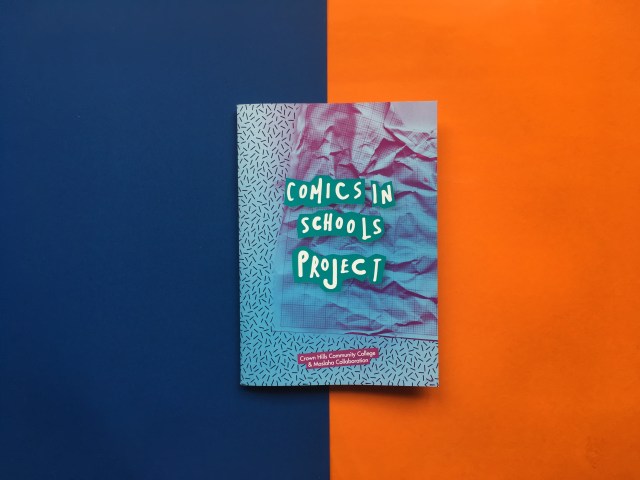
What are the key challenges you face in your work? What are your tactics for overcoming these?
Early on in my career I took on a lot of work and said to yes everything, was was great and opened a lot of doors but I ended up working on things I didn’t care about and weren’t my vibe. I worked for corporate companies and ended up making bland work. But over the years I’ve learnt to be more critical, saying no is just as important as saying yes. I have a checklist; to get on my books, you have to check off at least two of the following: Is its meaningful work? Is it an area I want to go into or work on more? Is it paid well? Occasionally a project will check all three, and I know I’m onto a winner.
How do you approach time management?
Planning! I have a Midori planner which I love more than anything, inside it I have a week by week view plus a month by month which lets me plan out work, clients, bookings and social stuff. There’s something really satisfying about giving yourself life-admin days once a month to sort your shit out. Coloured coded highlighters and post notes are where its at, mate.
And what about work-life balance?
I burnt out a quite a lot. Work can end up coming in weird waves of all or nothing, occasionally steady flows but I tend to take on a lot more than I shout; say yes now and try to find the time later.
I’ve found my cycle of productivity after a lot of trial and error. I work extensively for a few weeks solid and ride the wave of productivity until I’m exhausted, then give myself a week and bit off from everything. Everything. I just take a break. I’ve found this is working well for me at the moment. Having said that, I’m always mixing up and changing my approach to working managing the burnout.
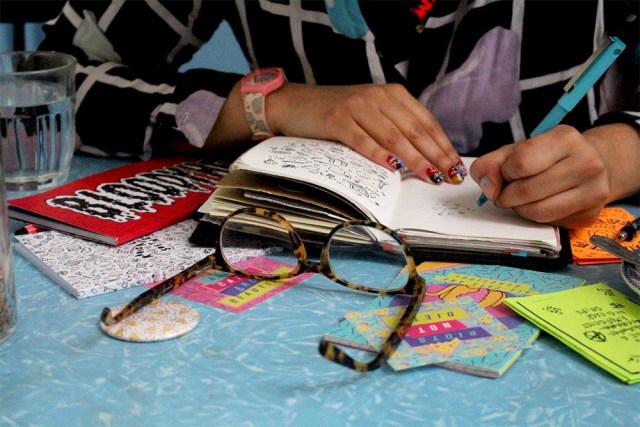
Does your work feel financially sustainable? And how do you feel generally about the money side of ‘following your arrow’?
I’m not a millionaire. Logistically, I’ve found having a part-time job or client or something in the background helps. A steady income enables me to take on risker, more creative and often more rewarding work. I lecture one (maybe two) days a week, this is my steady income. So I know that if worst comes to worst I have that money coming in.
Other work, like side-hustles, tend to flow in and out, some pay shit, some pay well, but that’s a judgement I make based on the client, work, project and potential to take on. As a general rule, I don’t work for free (and you shouldn’t either: you labour is of value and you should be treated as such). The only time I do work for free is for activist, underfunded, do-good types that are doing brilliant work that I want to support and be a part of; I normally approach them or we have an existing relationship.
Where would you like to see yourself in five, ten years’ time?
You sound like my Mum. I don’t know. Loosely I’d like to still be designing, and doing what I am now. I want to start taking on some installation design work; I’ve only dabbled but it’d be nice to work on it properly. I really enjoy lecturing on everything about feminism, gender, anarchism and more. Last year I lectured all over the country which was great; more of that would nice to sandwich in.
I’d like to keep self-publishing. I’ve done a few zines, a poetry book, and I want to put of a few more (I’ve some in the works already!) I’d also like to collaborate more outside of my discipline. I’ve started working with a few designers and collectives with friends and its a really nurturing and enlightening experience, so I’d like more of that!
How do you market your business?
I use social media a lot but not to actively ‘promote’ or ‘market’ myself, but more to be part of a community of designers, creatives and activists. I’ve gotten work through that but more as a nice by product rather than the end goal. Marketing isn’t my thing; for me, self-promotion, sharing, building communities through work and social media is far more powerful.
What’s the most valuable tool in your kit?
My laptop. This isn’t unique or special but hands down my Mac is most my important tool. Teamed with Adobe Creative Suite, wifi and a decent text editor (I like writing in iAWriter) I’m unstoppable: I have my entire life, work and everything that I do. If it wasn’t for my laptop I wouldn’t be able to produce anything with the speed, efficiency, level and platform that I do.

How does being LGBTQ impact on your business (if at all)?
A lot of my work tends to be in cultural, arts and activist sector, so a lot it naturally addresses that. I try to make my work as inclusive and representative as possible, for example I’m working on a tarot deck at the moment which is all-femme, all-POC, all-80s vibes deck; its all about representation. I’ve also been really luck to work on projects and clients who are doing good work and social change with LGBTQIA+ communities. For example I worked on a project within University College London’s Urban Laboratory, by Nightlife Spaces. Their aim is to build an evidence base to document the presence of existing and past LGBTQI spaces in order to understand the value of these spaces for LGBTQI and wider communities, and to the cultures and heritage of London. It was so amazing, there was so much research put into this project; I worked on the visual identity and thought it was a really good process, for fantastic clients.
What three websites, blogs, books or people do you rate for business advice or ideas about your work?
My best pal Sarah lent me a book called The Life-Changing Magic of Not Giving a F**k and it came at such a good time: I’d taken on a massive new role with my teaching, was feeling really stressed and overwhelmed, and Sarah passed me this hardback over a hot a chocolate and it really resonated.
Podcasts, I love podcasts. I listen to them while I work (listening to one right now as I type this) and just before I go to bed. One I find that helps me focus and get in the flow is Beautiful Stories From Anonymous People. It’s so intimate, it’s like an hour of listening in to a phone call with an anonymous person, and they share such depth and important parts of their lives, relationships, work and so much more. It helps me keep perspective when work gets too much.
Inclusive Mosque gets a shout. We’re currently working on a rebrand, and they’re an amazing space, they’ve achieved so much in the few years they’ve been running and are so inspiring. Inclusive Mosque is an inclusive spiritual space, actively welcoming women, LGBTQIA+ people, disabled people, and many others with marginalised identities.
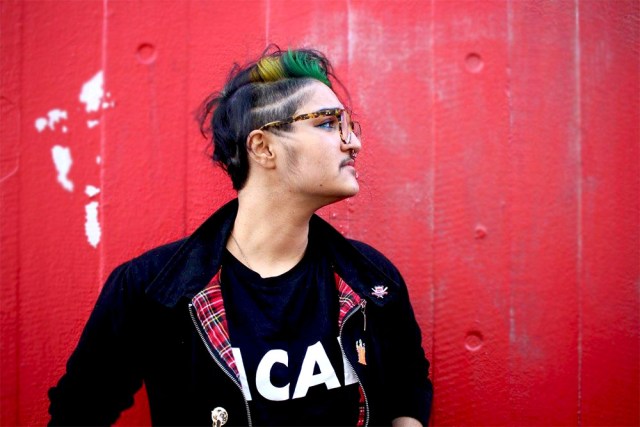
What’s your hot tip for queer folks who want to start their own business?
Do it your way. It’s a really liberating experience: you can finally make your own rules and hours and type of work. Enjoy that! If you love early mornings, work early mornings. If you can’t get out bed till 10am, only have meetings and calls scheduled for post-lunch. Do it your way, do it for yourself, and be as punk rock about this as you can.
You can view Soof’s gorgeous portfolio at soofiya.com, and keep up with them on Twitter and Instagram!








Comments
I have the Bloody Hell zine and it is THE COOLEST and Soof is the coolest and I loved this whole deal. YAY.
I LOVE the idea of determining whether to work on something or not based on checking off at least two of the “Is it meaningful work? Is it an area I want to go into or work on more? Is it paid well?” questions. I just sketched out a Venn diagram to visualize it, and all the possible pairings offset each other so well. Kudos to Soof for coming up with such a deceptively simple vetting process!
Right? And I love that you turned it into a Venn diagram! I’m gonna do the same and put it on my wall :)
I loved everything about this. Design crushing hard!!! I am not a graphic designer (closeted architect) but currently reading “how to be a graphic designer without losing your soul” by Adrian Shaughnessy and the timing of this interview couldn’t have come at a better time. <3
(It sometimes bugs me that the Follow your arrow colum has not a lot of comments, I just want to tell Beth that she does an amazing job finding interesting and diverse queers who open new worlds of possibility, keep up the good work!!)
Thanks N! I *love* doing this column.
It’s good to hear about burnouts. I feel like the ‘ride the creative wave for a few weeks then crash and rest for one’ is very real. It’s great to be true to your way or working when self employed. When I have a day job I can’t take a week off every month to recharge because of the way work is structured. It’s a shame.
I love follow your arrow, I go back to it when I feel like giving up.